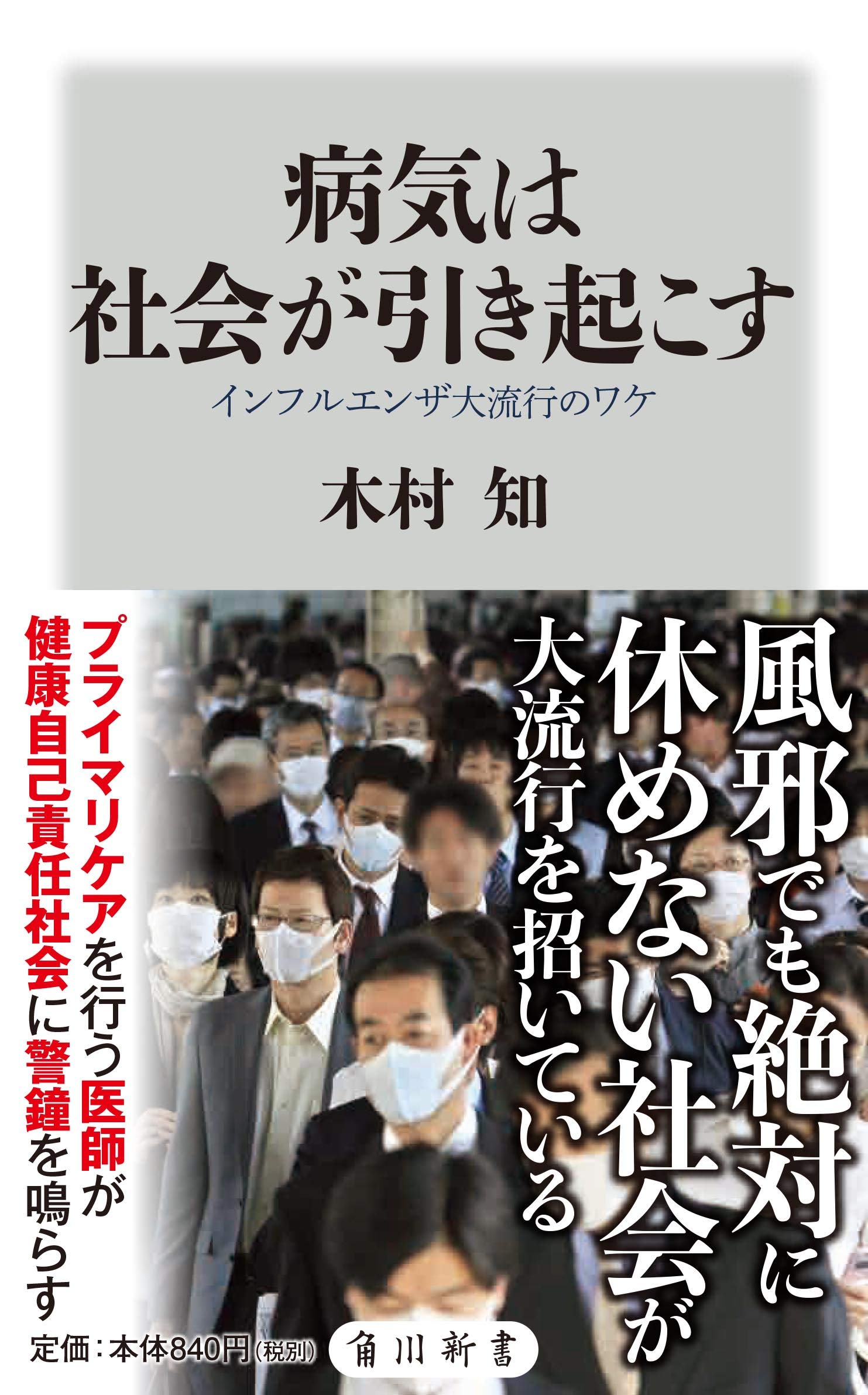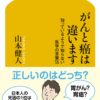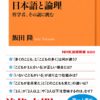
内容が充実したいい本
新書で223ページという標準的なサイズです。その中に大切なことがコンパクトにまとめられています。
理路整然としていて、かつ実例も多く、かなりの文章の達人だと思いました。
医者は病気を治すことができない
詳しくは書かれていませんが、これが著者の考えの基本にあるように思います。とても謙虚です。
「薬で病気の元を殺す」「悪いものは手術で取り除く」(著者は外科医です)という西洋の発想とは正反対です。患者は自分で治る。医者はそれを助けるだけです。
悪者は殺してしまえ、というのが「戦争」ですよね。「ウィルスや細菌を殺してしまえ」というのも同じ発想です。日本はむしろ「慈悲」の心が中心にあります。
「歴史」観というのも、そういう視点から考え直さなければならないのではないでしょうか。
発熱や咳は「ウィルス(細菌)」がおこすか
風邪で発熱をするのは、風邪のウィルスが熱くなるわけではありません。ウィルスを排除しようとして、人間(動物)の体がおこす反応が発熱であり、咳です。死んでいる人間や動物は発熱も咳もしないですよね。とても当たり前のことです。そんな当たり前のこと(「科学」や「論理」以前のこと)が何故かわかっていない医者が多いような気がします(わたしも昔、風邪で病院に行ったときに抗生物質を処方された気がします)。そこで「解熱剤」や「咳止め」を処方します。せっかく体が自分で治ろうとしている反応を無理やり抑えるのですから、病気が長引くのは当然です。長引けば、当然、感染も広がりやすくなりますよね。
この体の反応が「免疫系」と言われているものです。免疫ではありませんが、悪いものを食べたら、吐いたり、下痢をしたりしますよね。その悪いものを体外に排出しようとしているのです。それを吐き気止や下痢止で止めてしまったらどうなりますか。悪いものが体の中にとどまるということです。
確かに、発熱や咳、吐き気や腹痛はつらいです。でも、それが「生きている」ということにほかなりません。
「楽しい」「嬉しい」というからだ(心)の反応と同じように「苦しい」そして「死」ということも「生きている」ことそのものなのです。
ところが、いつの頃からか、「楽しい」「嬉しい」は自分で、「苦しい」や「死ぬこと」は他人に、という考えが主流になりました。それは「食べるのは私。ウンコをするのは別の人」という考えですよね。(笑)
都市と地方
これが、「電気を使うのは都市。原発やその廃棄物は地方」という発想になります。「スマホを使うのは先進国。その原料(レアメタル)を採るのは発展途上国の劣悪環境で働く子どもたち」というのも同じ発想です。
一部の金持ち(勝ち組)のために、多くの貧困が生まれているのを是認する発想も同じです。
そして、その発想と同時に「それはおかしいんじゃないか」という考えも常にあります。「道徳」と呼ばれたり「倫理」と呼ばれたりすることもありますが、これが「慈悲」という心の働きですよね。仏教だけじゃなく、キリスト教やイスラム教にもあります。どの文化も、それがその文化を支えています。
作るのはあなた、食べるのは私
性役割(ジェンダー、性差別)が批判され、「イクメン」や「主夫」が話題になっています。女性は「家事と育児」という考えは差別そのものですが、「男も台所に立つべき」とか「男も育児をするべき」とかいうのはどこか違う気がしています。わたしは嫌いです。それは、論理を「倫理(道徳)」とすり替えているからです。
その基本には、女性労働力を安価に使おうという資本の要請があります。事実として、男が女を養う、あるいは専業主婦というのは「夢」でしか無くなってしまいました。日本の労働者の「実質」賃金は「半減」していると思います。
最近、わたしは論理と感情の対立を解消しようとしていますが、そこでの基本は「論理には論理を」「倫理には倫理を」ということです。
オリンピックも、脳死も、新型コロナも論理を倫理で、倫理を論理で批判していくという不毛の議論が続いているように思えます。わたしはそこに解決の可能性は見いだせないのです。たぶん、問題とすべきなのは「作る」と「使う」の分離、「論理」と「倫理」との分離だと思います。
立花隆の業績もその視点から再評価する必要があると思います。
サラリーマン医師と自営の病院
この本を読んで、「いい本だ」と思う人は、じつは読む前から著者と同じ発想を持っていたのではないでしょうか。そうじゃなくて「間違って」この本を手に取った人は数ページで読むのをやめるでしょう。
病気(感染症の流行)は「ウィルス」が引き起こすと思っている人はこの本は読まないと思うのです。「答えは求める前にすでにある」のです。
多くの医者が「人を助けたい」という気持ちで医師の道を選んだと思います。でも、この本で描かれているような劣悪な医療現場で働き続けることは、なかなかできることではありません。サラリーマン(労働者)医師は採算より「人を助ける」気持ちをまだ持てるかもしれません。でも、民間病院を経営する医師は「儲ける」ことを主眼に置かなければ、診療を維持することができません。立場が違えば、発想が違ってしまうと思います。
「日本医師会」はもともと民間病院の医師の団体です。
感染症・疫病
ペスト、梅毒、インフルエンザ、新型コロナウイルス・・・。「人類の歴史は感染症との闘いの歴史」と言われることがあります。「細菌」や「ウィルス」が発見されたのはごく最近ですが、ヨーロッパでは数々の感染症の記録がありますし、日本でも平安時代以前から疫病の記録があります。歴史というのは記録そのものですよね。
ダニエル・デフォーの"A Journal of the Plague Year"は平井正穂が『ペスト』と訳していますが、「感染症の記録」ですね。北里柴三郎が「ペスト菌」を発見したのは1894年です。小説『ペスト』の舞台は1665-66年です。「細菌」が発見されたのは1674年(レーウェンフックの発見)。ロベルト・コッホが病気と細菌の関係を述べたのは1876年。「ウィルス」が発見されたのは19世紀から20世紀にかけてです。
私たちが過去を見るというのは「現在から観る」ということ以外ではありえません。病気は生物(あるいは物質)が引き起こすという考えは、わずか100年くらいの間に広まったのです(それまでは「悪魔の行為」とかと考えられていました)。
「もの(客体)」としての「敵」が見つかったあとには「それをやっつける(排除する)こと」が続きました。そのとき病状を引き起こすのも細菌やウィルスとされてしまいました。病気が「病状」ではなく、「もの」だとされたのです。「PCR検査陽性」とはまさしくそのことですね。西洋的「主客構造」からは当然の帰結です。自分の体が発熱するというのは「主体の自己崩壊」ですから、西洋論理では認められないのです。
「免疫」というのは、画期的な発想だと思いますが、それによって「自分の体」を主体から完全に独立させて「客体」として捉えることでもあります。主体が肉体から完全に独立すること。主体(自我)の完成であり、新たな「魂」の発見です。
そして、その主体はAIに取って代わろうとしています。主体すら無くなって、論理だけが残るということです。
もう一つの道
免疫学は今話題の「ワクチン」も生み出しました。これも生物を「もの」と扱い、「機械的」に操作しようという発想です。
そして、(分子)生物学は体の中だけでなく、細胞の中の微生物やウィルスも発見しました。私たちは、細菌やウィルスと「共生」しているのです。そう考えたときには、「もの」「客体」あるいは「外部」(あるいは他人)と、「こころ」「主体」「内部」(あるいは自分)との境目は曖昧になります。その境目こそ「論理」が作り出したものではないでしょうか。
その境をなくすことも、主体の崩壊です。そして、この場合は主体の崩壊とともに「論理」もなくなるように思います。
どちらにしても、いずれ主体はなくなります。どういう生き方をするのかは今生きているそれぞれ(という「個体」というもの)ですが、完成することのない主体を持ち続けて苦しむことがしばらくは続きそうな気がします。
「病気は社会が引き起こ」します。けっして細菌やウィルスが引き起こすわけではありません。細菌やウィルスと主体との対立、社会と個人との対立が「病気」を引き起こすのだと思います。
⟨impressions⟩
A good book with a lot of content
The standard size of the new book is 223 pages. The important things are summarized in a compact manner.
I thought he was a master of writing because he was well-organized and had many examples.
Doctors can't cure illness
It's not written in detail, but I think this is the basis of the author's idea. I am very humble.
It is the exact opposite of the Western idea of "killing the cause of illness with medicine" and "removing bad things with surgery" (the author is a surgeon). The patient heals himself. The doctor will only help you with that.
Kill the bad guys, isn't it "war"? The same idea is to "kill viruses and bacteria." Rather, Japan is centered on the spirit of "mercy."
I think the view of "history" must be reconsidered from that perspective.
Does fever and cough cause "viruses (bacteria)"?
Cold fever does not mean that the cold virus gets hot. The reaction that the human (animal) body makes in an attempt to eliminate the virus is fever, which is a cough. Dead humans and animals do not have a fever or cough. It's very natural. I feel that many doctors don't understand why such a natural thing (before "science" or "logic") (I also felt like I was prescribed antibiotics when I went to the hospital because of a cold. I will). Therefore, we prescribe "antipyretic" and "cough medicine". It is natural that the illness will be prolonged because the body will forcibly suppress the reaction that it is trying to heal. Of course, if you prolong it, the infection will spread more easily.
This body reaction is called the "immune system." It's not immune, but if you eat bad food, you will vomit and have diarrhea. I'm trying to get rid of that bad thing. What if I stop it with nausea or diarrhea? It means that bad things stay in the body.
Certainly, fever, cough, nausea and abdominal pain are painful. But that is nothing but "alive".
"Suffering" and "death" are just "living" as well as the reaction of the body (heart) that says "fun" and "happy".
However, from some time ago, the idea that "fun" and "happy" are for oneself and "painful" and "dying" are for others has become mainstream. That is the idea that "I eat. It's another person who poops." (Lol)
Cities and regions
This is the idea that "electricity is used in cities. Nuclear power plants and their waste are in rural areas." The same idea is that "smartphones are used in developed countries. The raw materials (rare metals) are used by children working in the harsh environment of developing countries."
The idea of admitting that a lot of poverty is born for some rich people (winners) is the same.
And at the same time as that idea, there is always the idea that it is strange. Sometimes called "morality" or "ethics", this is the work of the mind called "mercy", isn't it? Not only in Buddhism, but also in Christianity and Islam. Every culture is underpinned by it.
You make it, I eat it
Gender roles (gender, sex discrimination) have been criticized, and "Ikumen" and "house husband" have become a hot topic. For women, the idea of "housework and childcare" is discrimination itself, but I feel that "men should also stand in the kitchen " and "men should also raise children " are somewhat different. I will. I hate it. That is because it replaces logic with "ethics (morality)."
At its core, there is a demand for capital to use the female labor force cheaply. As a matter of fact, a man feeding a woman or a housewife is no longer a dream. I think the "real" wages of Japanese workers are " halved ".
Recently, I am trying to resolve the conflict between logic and emotion, and the basics there are "logic for logic" and "ethics for ethics".
It seems that the barren debate that the Olympics, brain death, and the new Corona will criticize logic with logic and ethics with logic continues. I can't find a solution there. Perhaps the problem should be is the separation of "make" and "use", and the separation of "logic" and "ethics".
I think Takashi Tachibana's achievements need to be reassessed from that perspective.
Salaryman doctor and self-employed hospital
If you read this book and think it's a good book, you probably had the same idea as the author before you read it. Instead, anyone who "wrongly" picks up this book will stop reading in a few pages.
People who think that illness (infectious disease epidemic) is caused by a "virus" will not read this book. "The answer is already there before you ask."
I think many doctors chose to be doctors because they wanted to help others. However, it is difficult to continue working in the poor medical field as depicted in this book. Office worker doctors may still be more "helping" than profitable. However, doctors who run private hospitals cannot maintain medical care unless they focus on "making money." I think that if you are in a different position, your ideas will be different.
The "Japan Medical Association" was originally a group of doctors from private hospitals.
Infectious diseases / epidemics
Plague, syphilis, influenza, new coronavirus ... It is sometimes said that the history of mankind is the history of fighting infectious diseases. Although "bacteria" and "viruses" have been discovered only recently, there are numerous records of infectious diseases in Europe, and there are records of epidemics in Japan even before the Heian period. History is the record itself, isn't it?
Daniel Defoe's "A Journal of the Plague Year" is translated by Masao Hirai as "Plague", but it is a "record of infectious diseases". Shibasaburo Kitasato discovered "Yersinia pestis" in 1894. His novel "Plague" is set in 1665-66. "Bacteria" were discovered in 1674 (discovery of Leeuwenhoek). Robert Koch described the relationship between disease and bacteria in 1876. The "virus" was discovered in the 19th and 20th centuries.
To see the past can only be to "see from the present." The idea that illness is caused by living things (or substances) spread in just about 100 years (until then it was thought to be the "devil's act").
After finding the "enemy" as the "thing (object)", "defeating (eliminating) it" continued. At that time, it was also considered that it was bacteria and viruses that caused the medical condition. The illness was not a "medical condition" but a "thing". That's exactly what "PCR positive" means. This is a natural consequence of the Western "main customer structure". The fever of one's body is "self-destruction of the subject", so it is not recognized in Western logic.
I think "immunity" is an epoch-making idea, but it also means that "your body" is completely independent of the subject and is regarded as an "object". The subject is completely independent of the body. It is the completion of the subject (ego) and the discovery of a new "soul".
And its subject is about to replace AI. It means that even the subject disappears and only the logic remains.
Another way
Immunology has also created the much talked about "vaccine". This is also the idea of treating living things as "things" and manipulating them "mechanically".
And (molecular) biology has discovered microorganisms and viruses not only in the body but also in cells. We are "coexisting" with bacteria and viruses. When you think so, the boundary between "thing", "object" or "outside" (or others) and "heart", "subject" or "inside" (or yourself) becomes ambiguous. Isn't that boundary created by "logic"?
Eliminating that boundary is also the collapse of the subject. And in this case, I think that "logic" disappears with the collapse of the subject.
In any case, the subject will disappear eventually. The way of life depends on each person who is alive now (that is, an "individual"), but I feel that it is likely that we will continue to suffer from having an unfinished subject for a while.
"Illness is caused by society". It is never caused by bacteria or viruses. I think that the conflict between bacteria and viruses and the subject, and the conflict between society and the individual cause "disease".
[著者等(プロフィール)]
木村 知
1968 年カナダ生まれ。医師。2004 年まで外科医として大学病院等に勤務後、大学組織を離れ、総合診療、在宅医療に従事。診療のかたわら、医療者ならではの視点で、時事・政治問題などについて論考を発信している。ウェブマガジンfoomiiで「ツイートDr.きむらともの時事放言」を連載中。医学博士。2級ファイナンシャル・プランニング技能士。著書に『医者とラーメン屋「 本当に満足できる病院」の新常識』(文芸社)。
ツイッターID @kimuratomo
なぜインフルエンザは毎シーズン大流行するのか。総合診療に従事する著者は「風邪でも絶対に休めない」という社会の空気が要因の一つだと考える。現在の日本では、社会保障費の削減政策が進み、負担は増え健康自己責任論さえ叫ばれ始めた。医療、社会保障制度のあり方を考察する。
風邪でも絶対に休めない社会がインフルエンザの大流行を招いている
(目次 おもなもの)
はじめに ―202X年の医療現場
第1章 カゼでも絶対に休めない人へ
かかったかな、と思ったらすぐ受診?
市販のカゼ薬は弱くない
陰性判定がインフル流行を引き起こす
テレビの情報バラエティで医療機関が大混乱
夢の薬か? ゾフルーザ
世界のタミフルの7割超が日本で
皆勤賞、やめませんか
休むことは罪悪か
「インフルだったら休めるのですが、カゼだと休めないので」
第2章 命の沙汰もカネ次第
いつでも、どこででも、だれでも医療が受けられる国
病院が早く退院させたがるワケ
医療費亡国論の源流
軽症者を大病院に行かせないために
医療費抑制政策が過剰診療を誘発する
国保財政をいかに守るか
窓口負担は0にして
民間医療保険に入るべき?
第3章 世界に誇れる? ニッポンの医療
全世代で高い貧困率
弱肉強食か、支え合うか
ハイパフォーマンス国家、日本
酔っ払いに手術されてもいいですか
医師の働き方改革
もっと#8000を
コンビニクリニックは医療難民の最後の砦
猛暑五輪、行き場を失う熱中症患者
第4章 健康自己責任論の正体
病気は公平に起こらない
健康増進法は健康自己責任法
日本のホームレスは贅沢なのか
自助という言葉に要注意
厳しい境遇ゆえのやっかみ
不正受給よりも深刻な問題
自己責任社会にとって不都合な制度
第5章 困ったときはお互いさまの社会へ
老後2000万円問題
消費税は財政健全化に寄与してきたのか
内憂を外患でごまかすな
命を守るカネのために、命を守るカネを削る
不寛容ブーム
人間の本性を直視するところから始めよう
202X年の未来予想図
おわりに
風邪でも絶対に休めない社会がインフルエンザの大流行を招いている
(目次 おもなもの)
はじめに ―202X年の医療現場
第1章 カゼでも絶対に休めない人へ
かかったかな、と思ったらすぐ受診?
市販のカゼ薬は弱くない
陰性判定がインフル流行を引き起こす
テレビの情報バラエティで医療機関が大混乱
夢の薬か? ゾフルーザ
世界のタミフルの7割超が日本で
皆勤賞、やめませんか
休むことは罪悪か
「インフルだったら休めるのですが、カゼだと休めないので」
第2章 命の沙汰もカネ次第
いつでも、どこででも、だれでも医療が受けられる国
病院が早く退院させたがるワケ
医療費亡国論の源流
軽症者を大病院に行かせないために
医療費抑制政策が過剰診療を誘発する
国保財政をいかに守るか
窓口負担は0にして
民間医療保険に入るべき?
第3章 世界に誇れる? ニッポンの医療
全世代で高い貧困率
弱肉強食か、支え合うか
ハイパフォーマンス国家、日本
酔っ払いに手術されてもいいですか
医師の働き方改革
もっと#8000を
コンビニクリニックは医療難民の最後の砦
猛暑五輪、行き場を失う熱中症患者
第4章 健康自己責任論の正体
病気は公平に起こらない
健康増進法は健康自己責任法
日本のホームレスは贅沢なのか
自助という言葉に要注意
厳しい境遇ゆえのやっかみ
不正受給よりも深刻な問題
自己責任社会にとって不都合な制度
第5章 困ったときはお互いさまの社会へ
老後2000万円問題
消費税は財政健全化に寄与してきたのか
内憂を外患でごまかすな
命を守るカネのために、命を守るカネを削る
不寛容ブーム
人間の本性を直視するところから始めよう
202X年の未来予想図
おわりに
~~造る、創る、消費する、育てる、料理(調理)作る、使う~~

![ペストの記憶 (英国十八世紀文学叢書[第3巻 カタストロフィ])](https://m.media-amazon.com/images/I/511KUA+eoCL._SL300_.jpg)



